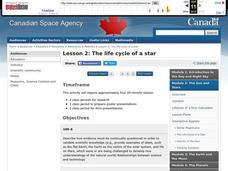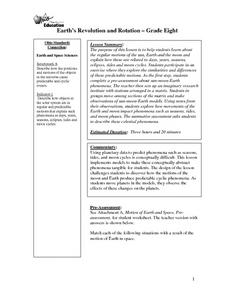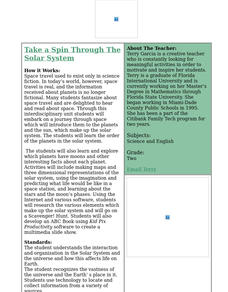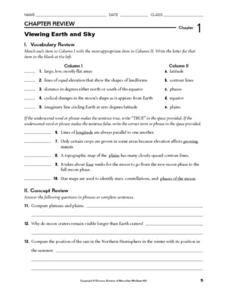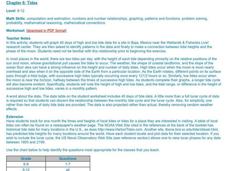Curated OER
Your Day as a Cycle
Fourth graders examine a variety of cycles. They take a look at life cycles of plants and animals, the cycle of the moon and tides, and other sequences of events in their daily lives. An interesting part of the instructional activity is...
Curated OER
Modelling Periodic Phenomena
In this Pre-calculus/Trigonometry worksheet, students determine the trigonometric function that best models the given data. The eight page worksheet contains explanation, examples, and twenty-one problems. Answers are not included.
S2tem Centers SC
Seasons
Winter, spring, summer, and fall—take the learning of the seasons beyond the elementary level to the middle school classroom. Curious learners begin by watching videos about the seasons and the rotation of planet Earth. Then, they...
Curated OER
Investigation 3 - What is Moonlight?
Third graders observe a demonstration explaining that the moon reflects sunlight in ordr to shine.
Curated OER
Weather
Students create a daily weather forecast including present temperature, high temperature, moon phase, sky watch, and occasional special reports dealing with weather phenomenon.
Curated OER
Energy Defined
Fourth graders complete activities to study the sources of energy and forms. In this energy instructional activity, 4th graders discuss the origin of energy and define it. Students participate in several experiments to further study...
Curated OER
The Earth in Space
High schoolers use computer images to explain why the Earth has seasons and examine the phases of the moon. They create 3-D images and present them to the class. They answer a series of questions at the end of the lesson.
Curated OER
The Sky Jeopardy
First graders reinforce concepts about sun, moon, day, night and sky by playing the Sky Jeopardy game. In the end, 1st graders get to nibble crackers in order to show the different phases of the moon.
Curated OER
World In Motion Curriculum
Middle schoolers explore the night sky and its solar system. Using a Digitarium planetarium system, students observe four constellations. They discover the phases of the moon and eclipses. Middle schoolers recognize the difference...
Curated OER
Time Intervals
In this time intervals worksheet, students solve 8 problems where they determine the time gamma-ray bursts last, the time black hole micro-flares are emitted, the time coronal mass ejections travel and the days between lunar phases of...
Curated OER
The Life Cycle of a Star
Students investigate the life cycle of a star and make conclusions based on evidence, research, and observation. In this lesson on space and scientific investigation, students describe the relationships between science and technology...
Curated OER
Stellar Lunar Curriculum
Students engage in a lesson that covers the concept of different phases of the moon. They name the cycles of the phases of the moon while using flashlights to simulate the light of the sun. They research information about several...
Curated OER
Earth's Revolution and Rotation
Eighth graders investigate the regular motions of the sun, Earth and the moon and explain how these are related to days, years, seasons, eclipses, tides and moon cycles. They participate in an exercise where they explore the...
Curated OER
Take a Spin Through the Solar System
Second graders participate in a variety of activities to explore the Solar System in this unit.
Curated OER
The Moon is made of Cheese
Eighth graders explore the reasons why they believe scientific ideas are true. They think critically rather than accept everything they are told without question.
Curated OER
Viewing Earth and Sky
For this earth and sky worksheet, students review terms associated with map reading. Students also review topographic maps and how contour lines represent elevation. This worksheet has 5 matching, 5 true or false, 5 fill in the blank,...
Curated OER
Space
First graders examine space in this unit of lessons. They create a KWL chart and write in their journals about space. They also examine the phases of the moon and identify the constellations.
Curated OER
Tides
Students graph 40 days of high and low tide data for a site in Baja, Mexico near the Wetlands & Fisheries Live! research center. They identify patterns in the data and finally to make a connection between tidal heights and the phase...
Curated OER
Constellations
Young scholars explore the major constellations. After reviewing the Earth's basic motions and their significance, students discuss the moon's orbit and revolutions. Using a Digitarium Alpha portable planetarium projector, they observe...
Curated OER
Graphing San Diego Tides
Students observe the tides in San Diego for one month. Using this information, they graph the tides on a chart along with the phases of the moon. They answer questions related to the graph to end the lesson.
Curated OER
How Do Weather Conditions and Lunar Cycles Affect Fishing Success?
Students use weather measuring devices to record and study weather conditions at different locations, during different times. They attempt to draw conclusions about the relationship between weather conditions, lunar cycle and fishing...
Curated OER
Tides - The Ins and Outs of Tides
Get your junior oceanographers to generate tidal prediction graphs on an interactive website. They will feel like experts in the field, or shall we say, experts in the ocean! This is a brief, but worthwhile activity that could be used to...
Columbus City Schools
Experiencing Eclipses
Don't be caught in the dark! Young scientists investigate the causes of both solar and lunar eclipses using an interactive to help them understand the development of an eclipse over time. They then research facts and characteristics of...
NASA
Collecting Electromagnetic Radiation
Astronomy is literally over your head, but this lesson will explain how we study it. Young scientists make telescopes, calculate and compare the light gathering power of lenses, and simulate detection of infared radiation. Materials...
Other popular searches
- Phases of the Moon
- The Phases of the Moon
- Science Phases of the Moon
- 8 Phases of the Moon
- Phases of the Moon Journal
- P Phases of the Moon
- Phases of the Moon Worksheet
- "Phases of the Moon












